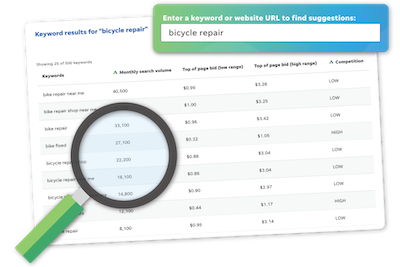Popular Keyword – Web Hosting Keywords
Search Popular Keywords in Your Industry
These are the most popular suggestions for Web Hosting Keywords generated by WordStream’s Free Keyword Tool. To get have all of these keywords sent to you, simply enter your Email address and click “Email Keywords” below.
Your keywords are on the way to your inbox!
Web Hosting Marketing Tips and Tricks
As ecommerce continues its explosive growth and a higher percentage of the world’s population gains access to the Internet, the demand for web hosting services will only grow. Plus, with half of the 30 million small businesses in the U.S. still lacking a website, web hosting businesses can rest assured that their services will be demanded long into the future.
Although the outlook is positive, web hosting service providers need to be proactive in their pursuits of prospective customers nonetheless. If your marketing team is too busy to become a force of online advertising experts, fear not—we’re here to provide our very best advice so you can focus on powering the Web. Let’s begin!
The ins and outs of web hosting aren’t exactly common knowledge. As such, a lot of searches for “web hosting” and “what is web hosting” are likely to come not from business owners who want to purchase your services, but instead from consumers who are merely interested in learning more. Therefore, when it comes to informational search queries, it’s best to hold off on showing your ads—otherwise, you’re going to spend a lot of money on clicks that don’t convert into paying customers.
Instead, allocate your paid search budget towards long-tail keywords such as “web hosting service for small business.” As you can imagine, more specific searches like this drive lower search volumes, and bidding on them means your ads will show to fewer people. But, the people who do see your ads are much more likely to click and convert—probably not right away, but at some point down the line.
Let’s harp on that point—prospects who don’t convert immediately—a little more. This is where remarketing comes into play. Remarketing via the Google Display Network (GDN) allows you to use your best banner ad creative to target prospects who have previously visited your website. So, when Sally from Company XYZ heads over to the Pitchfork website to see what music is getting critical buzz, she’ll be reminded of your web hosting services. Ideally, this happens a few times while Sally continues to mull over her options, and eventually she chooses your web hosting services for her company.
If GDN remarketing doesn’t sound precise enough to you, then you should look into remarketing lists for search ads. RLSA enables you to automatically increase your bid on a given keyword whenever one of your remarketing prospects includes it in a search query. When Sally from XYZ returns to Google and searches “best web host for small business,” your bid will get a boost and your ad will (in theory) move up the ad ranks. In essence, RLSA is a way to put your foot on the gas when your chances for converting a prospect peak.
Even if you successfully use RLSA and get your ad to the top of the search engine results page (SERP), you need to be certain that it will drive a click. Remember—you have to stand out amongst the two or three other ads as well as all the organic search results. Ad extensions allow you to clearly lay out all the terrific perks and features that come with your web hosting services. Whether you boast an all-star team of 24/7 customer support representatives or you offer a faster server than the competition, including it in your ad copy should drive higher click-through rates.
Finally, let’s talk about what comes after the click—your landing page. It’s crucial that you make the transition from SERP to landing page as seamless as possible. That means carefully transferring the messaging of your ad to the landing page. If you bring a prospect to a landing page that looks and reads nothing like the ad that preceded it, he’s going to be jarred and frustrated. This, you can imagine, is not conducive to driving a conversion.
For more online advertising tips and tricks, read the WordStream blog.
BUSINESS KEYWORDS
- Accounting Keywords
- Affiliate Keywords
- Auto Insurance Keywords
- B2B Ecommerce Keywords
- B2B Keywords
- Biotechnology Keywords
- Business Keywords
- Business Management Keywords
- Business Travel Keywords
- Construction Keywords
- Credit Card Keywords
- Debt Keywords
- Entertainment Keywords
- Finance Keywords
- Human Resources Keywords
- Insurance Business Keywords
- Internet Security Keywords
- Management Keywords
- Office Supplies Keywords
- Online Payment Solutions Keywords
- Software Keywords
- Startup Keywords
- Web Hosting Keywords
CONSUMER KEYWORDS
- Art Keywords
- Automotive Keywords
- Casino Keywords
- Cell Phone Keywords
- Computer Keywords
- Dating Keywords
- Ecommerce Keywords
- Electronics Keywords
- Email Keywords
- Fashion Keywords
- Golf Keywords
- Hotel Keywords
- Internet Keywords
- Jobs Keywords
- Law Keywords
- Mortgage Keywords
- Music Keywords
- Online Stores Keywords
- Pest Control Keywords
- Photography Keywords
- Plumbing Keywords
- Real Estate Keywords
- Restaurants Keywords
- Shoes Keywords
- Travel Keywords
- Wedding Keywords
FINANCE KEYWORDS
HEALTH & WELLNESS KEYWORDS
MISCELLANEOUS KEYWORDS
- Aerospace Keywords
- Agriculture Keywords
- Best Travel Keywords
- Coffee Keywords
- Dog Training Keywords
- Education Keywords
- Environmental Keywords
- Food & Beverage Keywords
- Forex Keywords
- Gifts Keywords
- Home Based Business Keywords
- Home Improvements Keywords
- Internet Games Keywords
- iPhone Keywords
- Jewelry Keywords
- Landscaping Keywords
- Legal Keywords
- Luggage Keywords
- Pharmaceutical Keywords
- Poker Keywords
- Retail Keywords
- School Education Keywords
- Solar Energy Keywords
- Transporation Keywords
- Women Fashion Keywords
- Work From Home Keywords

